You didn’t start a business to spend your nights wrestling with spreadsheets, color-coding invoices, or Googling what “reconcile” actually means. You’re already juggling business finances, late invoices, and a business bank login you can never remember.
You know bookkeeping matters, but every time you try to get organized, it feels more complicated than it should be.
Simple bookkeeping for business is about creating a system that works for you—one that’s easy to stick to, even when you’re slammed with everything else. No jargon. No fluff. Just clean, clear, low-stress bookkeeping that doesn’t take over your life.
What is Bookkeeping?
Bookkeeping is the part of your business that keeps the financial chaos in check. Bookkeeping helps you track your business transactions, organize business expenses, and prepare accurate income statements.
Bookkeeping covers everything from recording transactions and organizing receipts to reconciling bank statements and generating financial reports. It’s not just for tax season—it’s how you make smart, day-to-day decisions.
Types of Bookkeeping
Here’s a breakdown of the three key systems most businesses use so you can figure out what fits you best.
Single-Entry Bookkeeping
This is bookkeeping at its simplest. You record each transaction once, either as income or expense. That’s it.
It’s great if you’re a freelancer, side-hustler, or running a cash-only business with minimal complexity. But if you’re managing inventory, employees, or vendors, it’ll fall short real quick.
Double-Entry Bookkeeping
This one’s the standard for most legit businesses. Every transaction is recorded twice: once as a debit, once as a credit. It keeps things balanced and helps catch mistakes early.
Yes, it sounds more complicated, but most accounting software handles this in the background. You just plug in the details, and the system takes care of the rest.
Cash vs. Accrual Accounting
Cash accounting tracks money when it actually moves—income when you get paid, expenses when you pay out. It’s simple, straightforward, and great for many small businesses.
Accrual accounting tracks income and expenses when they’re earned or incurred, not when the money changes hands. It gives a more accurate picture of your business’s financial health, especially if you invoice clients or carry inventory.
10 Simple Bookkeeping Tips for Businesses

Bookkeeping really can be simple. If you keep it consistent and use the right tools, it can be one of the easiest parts of running your business. These tips will help you stay organized and stay sane.
-
Set aside a budget for taxes every single month.
Taxes aren’t a surprise—you know they’re coming. Treat them like a bill and stash that money monthly so you’re not scrambling come deadline day.
-
Keep your records organized from day one.
No more shoeboxes full of receipts. Use folders, cloud storage, or bookkeeping software to keep everything labeled and easy to find.
-
Track every expense—yes, even the coffee.
Those “small” expenses add up fast. Log them all in a balance sheet. It gives you a clearer picture of where your money’s going—and what you can write off.
-
Update your records daily, not just at tax time.
Trying to catch up on a year’s worth of books in one weekend? Hard pass. Reconcile your bank accounts regularly so your income statements and cash flow statements reflect reality.
-
Leave an audit trail that even future-you can follow.
If you get audited or just need to double-check something, you’ll want clear records of what was spent, when, and why. Attach receipts, add notes, and keep digital backups.
-
Stay on top of who owes you—and who’s late.
Accounts receivable is money you’re waiting on. Follow up on unpaid invoices regularly so you’re not accidentally giving away free work.
-
Know when every tax deadline hits (and don’t miss them).
Missing deadlines = fines and stress. Set calendar reminders for quarterly taxes, annual filings, and anything else your business is responsible for.
No shame in going old school. A simple spreadsheet can work just fine for freelancers or tiny businesses, as long as you actually keep it updated.
If spreadsheets feel clunky, software like Wave, ZipBooks, or Xero can automate a lot of the work and give you a better financial snapshot.
Templates for things like invoices, cash flow, or tracking expenses make it way easier to stay consistent—and save time when things get busy.
Basic Bookkeeping Terms You Need to Know

You don’t need to memorize a glossary, but understanding these basics will help you run a tight bookkeeping ship.
-
Transaction
Every time money moves—whether it’s a sale, a refund, a bill paid, or a loan received—that’s a transaction. These are the building blocks of your books.
-
Income (or Revenue)
This is money coming into your business. Sales, service fees, rental income—it all counts as income.
-
Expenses
Money going out. That includes everything from office rent and software to contractor payments and coffee runs (yes, that counts too).
-
Accounts Payable
Bills you owe. This includes vendors, suppliers, subscriptions—anything you haven’t paid for yet.
-
Accounts Receivable
Money people owe you. Sent an invoice that hasn’t been paid? That’s sitting in accounts receivable.
-
Ledger
Think of this as your master list of all transactions. It shows where your money’s been, line by line.
-
Chart of Accounts
This is how you organize your money. It’s a list of categories—like “Advertising” or “Office Supplies”—that you assign to every transaction.
-
Reconciliation
Matching your records to your bank statements to make sure they’re accurate. If your numbers don’t match, something’s off.
-
Cash Flow
The actual movement of money in and out of your business. Good cash flow means you can pay your bills and yourself on time.
Simple Bookkeeping for Small Business: Frequently Asked Questions
Can I do my own bookkeeping for my small business?
Yes, you can do your own bookkeeping if your finances are relatively simple. Many small business owners use spreadsheets or beginner-friendly software to track income, expenses, and taxes. As your business grows, you may want to outsource to a professional to save time and reduce errors.
What is the simplest form of bookkeeping?
The simplest form of bookkeeping is single-entry bookkeeping. Each transaction is recorded once as either income or expense. It’s easy to manage and works well for small businesses or freelancers with basic financial needs and no inventory or payroll.
How to do bookkeeping for beginners?
To start bookkeeping as a beginner, record all business income and expenses, organize receipts, reconcile bank statements, and review financial reports regularly. Use a spreadsheet or simple accounting software to stay consistent and avoid last-minute tax stress by creating accurate records.
Can I teach myself bookkeeping?
Yes, you can teach yourself bookkeeping. Many beginners learn using books, free online courses, and bookkeeping templates. Start by understanding basic terms, tracking daily transactions, and gradually learning how to manage reports like profit and loss statements.
Keep it Simple: Work with Bookkeeping Match Up

You Know the Secret to Simple Bookkeeping? Hiring Someone. Let someone else to handle your business finances, create accurate income statements, and prep for your tax return without the chaos. Bookkeeping Match Up will connect you with a pro who gets your business—and actually loves this stuff. It’s free, fast, and way simpler than doing it on your own.




